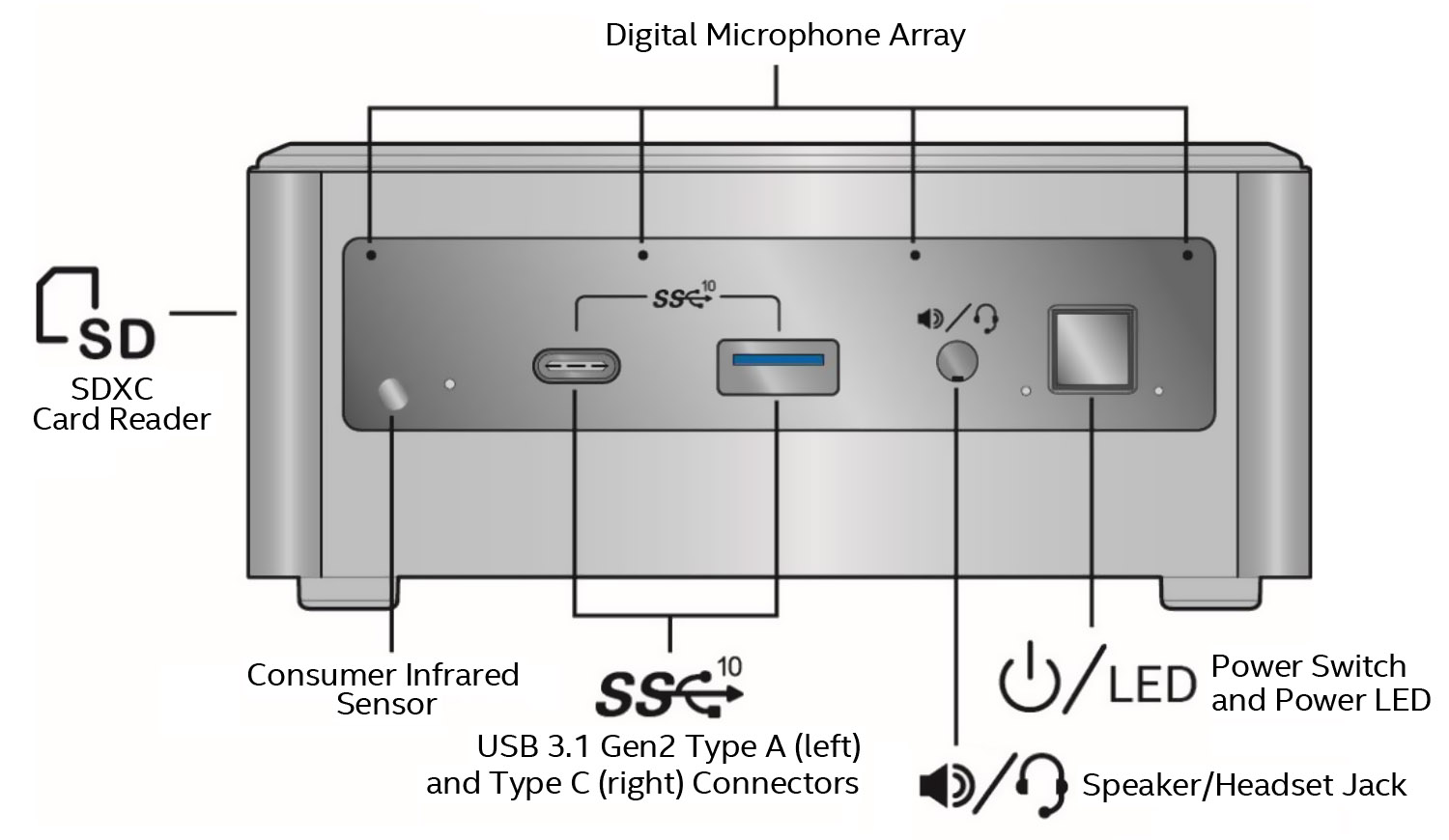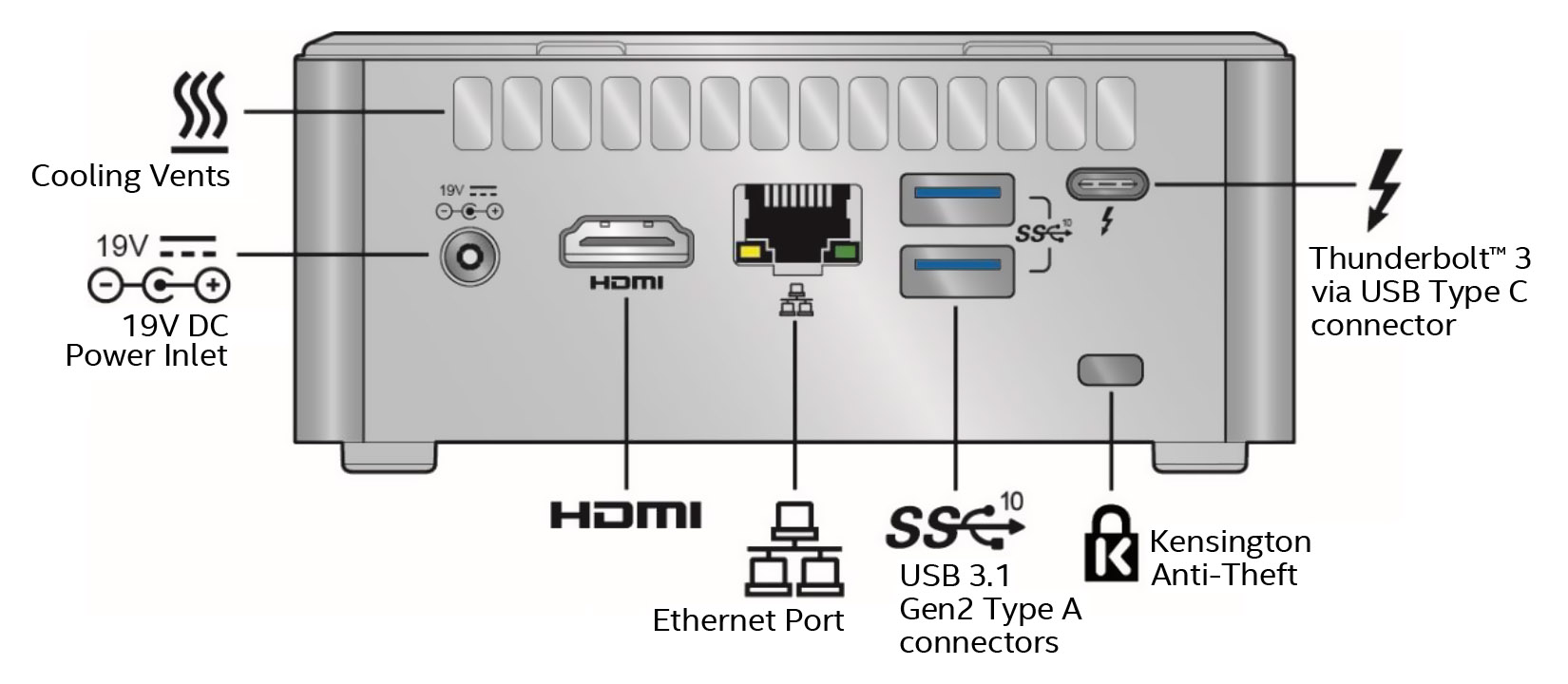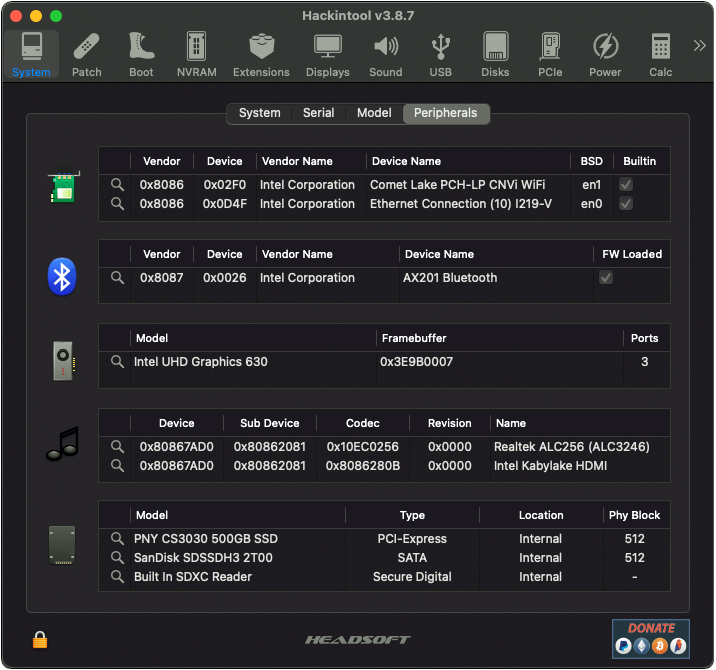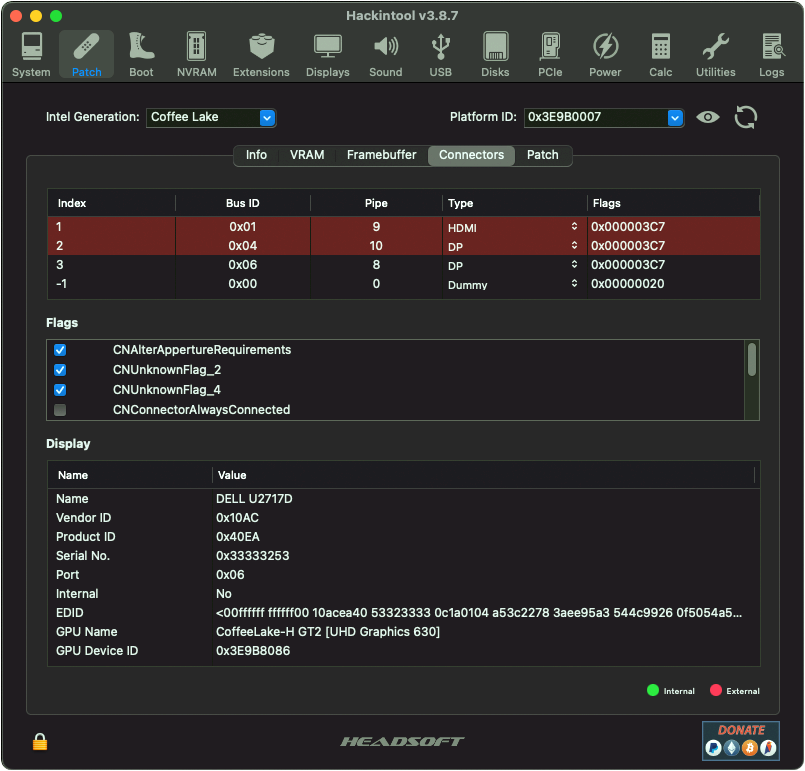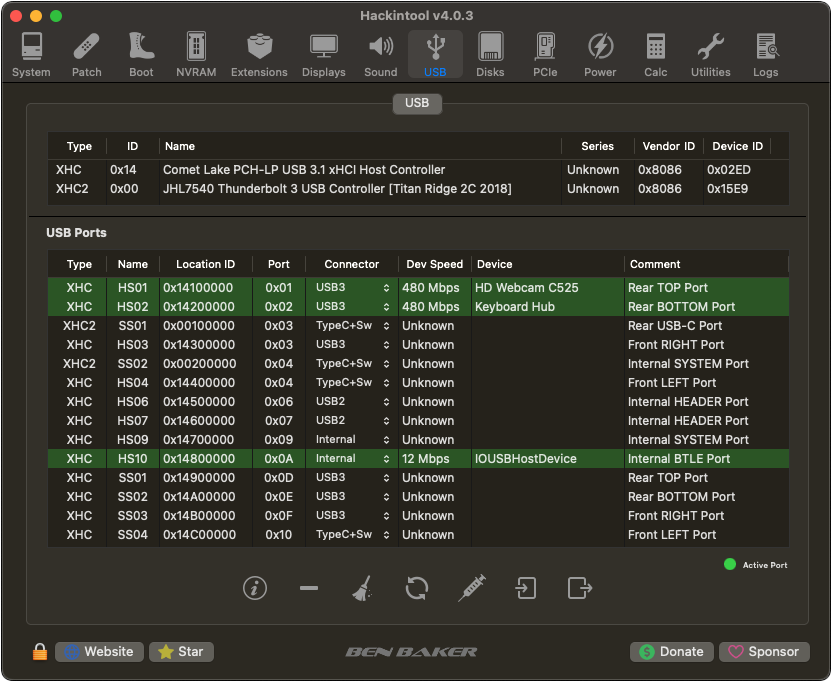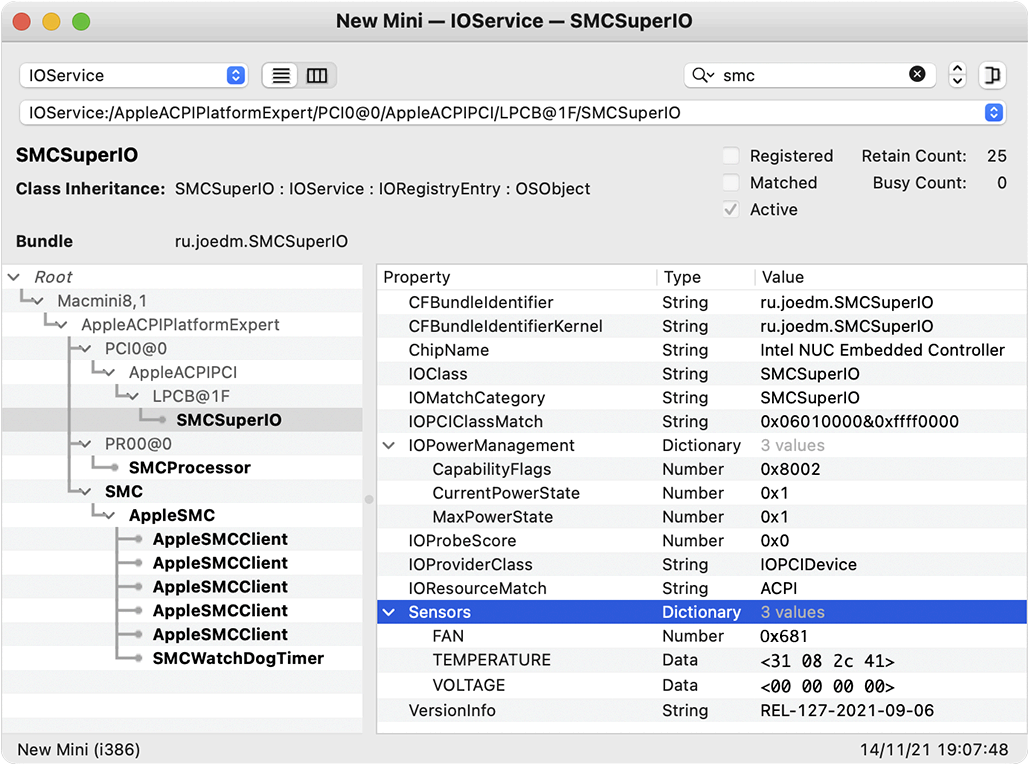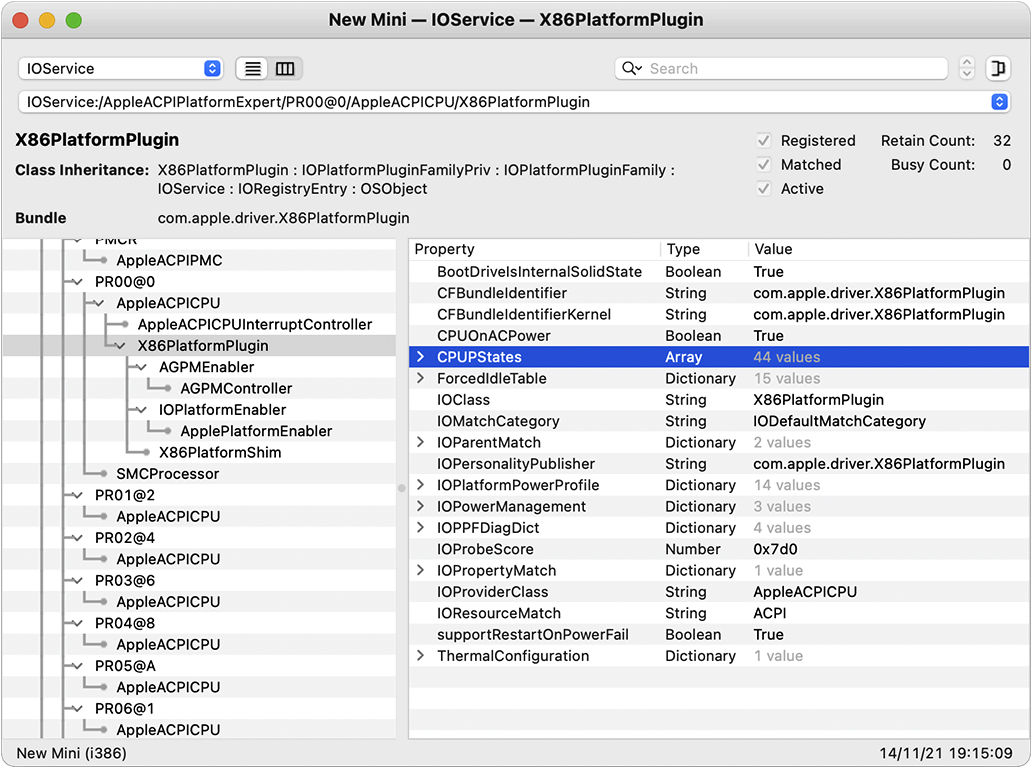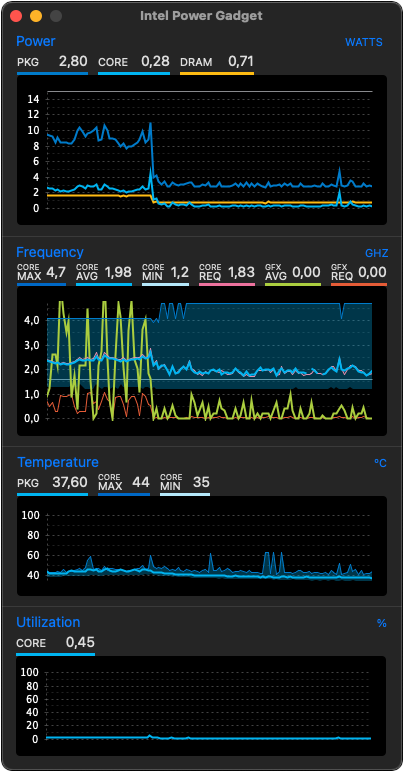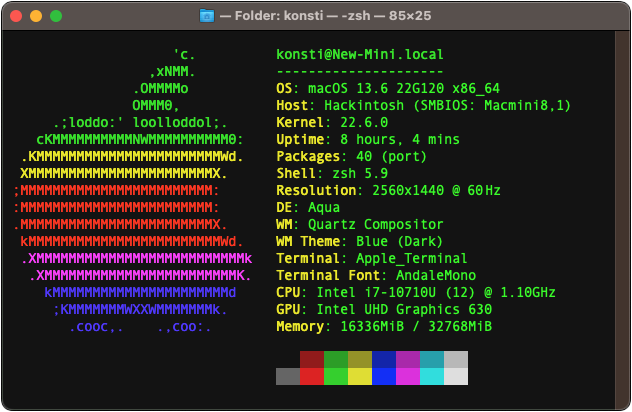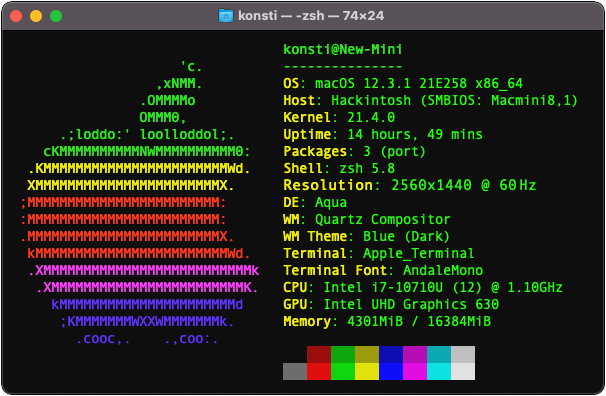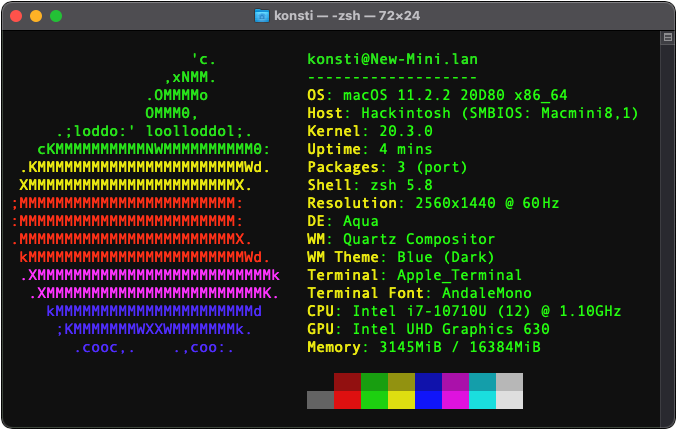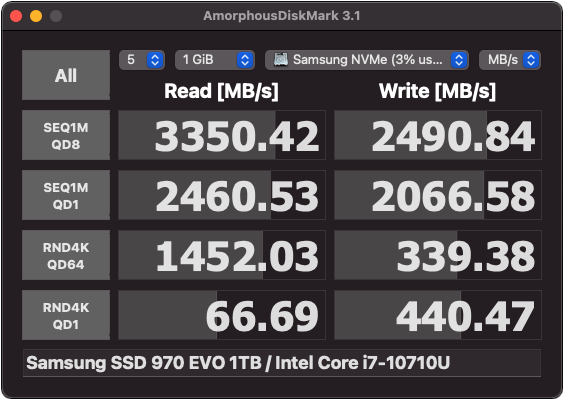Intel NUC Model NUC10i7FNH
This repository contains personal work and files, developed and maintained for a successful use with OpenCore EFI bootloader on this specific Intel NUC model. There are no ready, pre-packaged EFI solutions provided; instead, the needed configuration and ACPI files are published for those interested in studying the code, while creating their own bootloader configurations.
Platform Generation
- Sandy Bridge = All Core ix-3xxx (HD Graphics 3000)
- Ivy Bridge = All Core ix-3xxx (HD Graphics 4000)
- Haswell = All Core ix-4xxx (HD Graphics 4600)
- Broadwell = All Core ix-5xxx (Iris Pro Graphics 6200)
- Skylake = All Core ix-6xxx (HD Graphics 5xx)
- Kaby Lake = All Core ix-7xxx (UHD/Iris Plus Graphics 6xx)
- Coffee Lake = All Core ix-8xxx (UHD/Iris Plus Graphics 6xx)
- Whiskey Lake = Low-power Coffee Lake processors (mainly Mobile)
- Coffee Lake Refresh = All Core ix-9xxx (UHD Graphics 6xx)
- Comet Lake = All Core ix-10xxx (UHD Graphics 6xx)
Product Generation: Frost Canyon (2019)
Specifications: see Intel website
Downloads: see Intel website
BIOS Update & Recovery Instructions: see Intel website
BIOS Troubleshooting: see Intel website
Processor Generation: Comet Lake (2019)
CPU: Intel Core i7-10710U @ 1.10 GHz up to 4.70 GHz / 6 Cores / 12 Threads
GPU: Intel UHD 630 Graphics / 300 MHz up to 1.15 GHz
Specifications: see Intel website
Geekbench
V4 Scores: https://browser.geekbench.com/v4/cpu/search?q=Core+i7-10710U
V5 Scores: https://browser.geekbench.com/v5/cpu/search?q=Core+i7-10710U
Product Overview
Compatible Models
Mac Model: Macmini8,1
CPU: i7-8700B @ 3.20 GHz up to 4.60 GHz / 6 Cores / 12 Threads
GPU: Intel UHD Graphics 630
Everymac: https://everymac.com/ultimate-mac-lookup/?search_keywords=Macmini8,1
Board ID: 7BA5B2DFE22DDD8C
BIOS Revision: MM81.88Z.F000.B00.1809171422
BIOS Revision: MM81.88Z.F000.B00.1907261958
BIOS Revision: MM81.88Z.F000.B00.2001052107
BIOS Revision: MM81.88Z.F000.B00.2005132145
BIOS Revision: MM81.88Z.F000.B00.2101062036
BIOS Revision: MM81.88Z.F000.B00.2105212325
BIOS Revision: MM81.88Z.F000.B00.2110032010
BIOS Revision: MM81.88Z.F000.B00.2111162120
Current Setup
Memory: 32GB in 2 x 16GB SO-DIMM (1.2V)
RAM: Kingston Fury "Impact" DDR4 @ 2666MHz CL15 (Model KF426S15IB1K2/32)
WLAN: Intel Dual-Band Wi-Fi 6 AX201 (Embedded Module) [8086:02f0] (Subsystem ID 0x0074)
BTLE: Intel Bluetooth 5.1 (Embedded Module) [8087:0026]
NVMe: PNY XLR8 NVMe M.2 500GB (Model CS3030) [1987:5012]
Previous NVMe: Samsung EVO 970 NVMe M.2 1TB (Model MZ-V7E1T0BW) [144d:a808]
SSD: SanDisk Ultra 3D SSD 2TB (Model SDSSDH3-2T00-G25)
Thunderbolt: Intel JHL7540 Thunderbolt 3 Bridge (Titan Ridge 2C 2018) [8086:15e7]
Intel Product Compatibility Tool: see Intel website
N.B. The original RAM installed were 2 x 8GB Kingston HyperX "Impact" modules (Model HX426S15IB2K2/16) N.B. The PNY CS3030 system drive has a Phison E12 controller with LPDDR4 DRAM and Toshiba TLC memory.
Required BIOS Settings
For the most basic but required BIOS settings, as well as previous firmware releases, see BIOS folder.
OpenCore Picker Keyboard Shortcuts
When the Timeout key is set and OpenCore Picker displays the available boot drives:
- Press Space Bar to access the hidden Auxiliary tools e.g. UEFI Shell, NVRAM Cleanup, Verify MSR Lock.
- Press Tab to move selection to the newly available Reboot and Shutdown icons (since OpenCore 0.6.8).
Alternatively, if ShowPicker is disabled or Timeout set to 0, keep pressing Escape or Zero or Option keys to access Picker just before OpenCore kicks-in and starts booting.
Active Configuration
- Faking CPU ID is absolutely required, power management is native; MSR
0xE2cannot be unlocked;⚠️ - External USB 3.1 ports work as expected; using generated
USBPorts.kext; - Internal USB 2.0 headers not used; they are disabled in BIOS;
- External USB-C ports not tested yet;
- Intel graphics acceleration works as platform ID
0x3E9B0007with WhateverGreen; - Analogue audio output works as layout ID
0x17with AppleALC; - Digital audio output does not work yet;
- Embedded Intel LAN interface works with IntelMausi;
- Embedded Intel WLAN module works with OpenIntelWireless;
- Embedded Intel BTLE module detected with IntelBluetoothFirmware;
- CPU fan readings work with
ec-deviceasIntel_EC_V9with VirtualSMC; - Integrated Genesys Logic GL9755 SD card reader [17a0:9755] now seems compatible out-of-the-box;
- Power Management is present and active as
X86PlatformPluginis attached toPR00in IORegistry; - Sleep/Wake both work without issues; see "Power" section in Hackintool;
- Both NVMe and SSD SATA interfaces work with no effort nor kext needed.
For the complete list of all detected PCI hardware components and their respective addresses via lspci -nn command (in Ubuntu, loaded via USB) see here. This list was created with all devices enabled in BIOS and is used as a device "map" so that PCI IDs can be detected before tweaking the hardware (and BIOS) to run macOS.
Unsupported CFG Lock in BIOS ⚠️
Intel has never provided an option in its BIOS releases to allow setting the CPU value regarding CFG Lock i.e. the MSR 0xE2 register to be unlocked; the only method that originally worked, was to use special EFI tools such as ControlMsrE2.efi and CFGLock.efi via the UEFI Shell in OpenCore, with only the latter being successful.
However, since BIOS revision FN0056, it seems that Intel has locked NVRAM access to the respective MSR 0xE2 region; as a result, the tool CFGLock.efi can no longer change the CFG Lock setting.
To continue using macOS without issues, this new restriction now requires a specific "quirk" in OpenCore Kernel configuration to be set for the current hardware platform, so that kernel panics are avoided at all times: AppleXcpmCfgLock must be set to true.
As a reminder, according to the OpenCore Configuration manual and a further clarification in a support thread:
AppleCpuPmCfgLockrelates only toAppleIntelCPUPowerManagement.kextwhich is no longer used on El Capitan 10.11 or newer systems, for Haswell or newer platforms;AppleXcpmCfgLockrequires Haswell or newer platforms and affects any supported macOS (but is not used on any macOS using IvyBridge or older).
Intel UHD Graphics 630 Properties
The AAPL,ig-platform-id property set to 0x3E9B0007 is used for WhateverGreen to successfully enable acceleration on this graphics device [8086:9bca]. This ID represents the following properties and connectors:
| Properties | Value(s) |
|---|---|
| Platform ID | 0x3E9B0007 → 07009B3E → BwCbPg== |
| Device ID | 0x3E9B0000 → 9B3E0000 → mz4AAA== |
| Mobile | No |
| Stolen Memory | 57 MB |
| Framebuffer Memory | 0 MB |
| Video Memory (VRAM) | 1536 MB |
| Total Stolen Memory | 58 MB |
| Total Cursor Memory | 1 MB |
| Maximum Stolen Memory | 172 MB |
| Maximum Overall Memory | 173 MB |
| Model Name | Intel UHD Graphics 630 |
| Camellia | CamelliaDisabled (0) |
| Connector Count | 3 |
| Default Pipe / Port #1 | Bus ID 0x05 Pipe 9 Connector DP |
| Default Pipe / Port #2 | Bus ID 0x04 Pipe 10 Connector DP |
| Default Pipe / Port #3 | Bus ID 0x06 Pipe 8 Connector DP |
| Patching Required | No |
Read more at Intel® HD Graphics FAQs on the WhateverGreen repository.
USB Port Mapping on NUC Chassis
| USB 2.0 Port Name | USB 3.0 Port Name | Hardware Location | Controller |
|---|---|---|---|
| HS01 | SS01 | Rear TOP socket | Primary XHCI |
| HS02 | SS02 | Rear BOTTOM socket | Primary XHCI |
| HS03 | SS03 | Front RIGHT socket | Primary XHCI |
| HS04 | SS04 | Front USB-C socket | Primary XHCI |
| HS07 | N/A | Internal USB-C alias | Primary XHCI |
| HS10 | N/A | Internal BTLE port | Primary XHCI |
| N/A | SS01 | Rear USB-C socket | Secondary XHCI |
The above active and working USB ports are listed in Hackintool when the two internal (USB 2.0) headers and Consumer IR are all disabled in BIOS and when all unused or non-referenced USB ports are removed. In any other situation, ports such as HS05, HS06, HS07, HS08, HS09, USR1, USR2, SS05 and SS06 may be listed. All ports above are defined in USBPorts.kext according to their electrical connector.
N.B. Following some testing with external devices, it is believed that HS07 serves as the USB 2.0 alias for the rear USB-C (Thunderbolt XHCI) socket.
CPU Fan Reading Support
Support for the NUC's embedded chipset ITE IT5571 has been added in VirtualSMC (and more specifically SMCSuperIO.kext) since version 1.2.2 thanks to its developers. This is achieved by injecting the needed property <key>ec-device</key> and the correct identifier that corresponds to the NUC's model/generation own LPC Controller device (see here). For this NUC, the value is <string>Intel_EC_V9</string> thus enabling CPU fan readings in any monitoring tool.
Wireless Connectivity
The embedded 802.11ax wireless AX201 chipset [8086:02f0] has been working without issues with itlwm since Catalina. As for the embedded BTLE module, Intel reports it being a Bluetooth 5.1 device, which works in most cases with IntelBluetoothFirmware since Catalina, too. Both devices can be enabled in BIOS, and both drivers can be loaded through OpenCore.
CPU Power Management
With the injection of SSDT-PLUG.aml via OpenCore, we can verify that Power Management is present and active as X86PlatformPlugin is attached to the first CPU core PR00 per the Dortania Guide.
Changes Brought About by macOS 13
MacOS 13.x Ventura drops support for pre-Haswell CPUs. Moreover, much of userspace now requires AVX2 support; because of this, macOS "Delta" updates (i.e. small 1-3 GB updates that normally appear in System Settings) will no longer be available and the full update (±12GB) must be installed each time, as Delta updates only contain the non-AVX2 cache to support Rosetta on Apple Silicon machines. OpenCore patching mechanism relies on these AVX2 instructions.
Changes Brought About by macOS 12
MacOS 12.x Monterey has brought an important change in OpenCore configuration for BTLE, namely the required removal of IntelBluetoothInjector.kext and its replacement by BlueToolFixup.kext found inside BrcmPatchRAM package. The main IntelBluetoothFirmware.kext remains active and must still be loaded, as done previously.
There is also a distinct version of AirportItlwm.kext compiled for Monterey only that has to be installed, replacing the Big Sur version of the kext without any OpenCore configuration changes, however.
Changes Brought About by macOS 11
An analysis of all the novelties that Big Sur brings are detailed over at Dortania.
